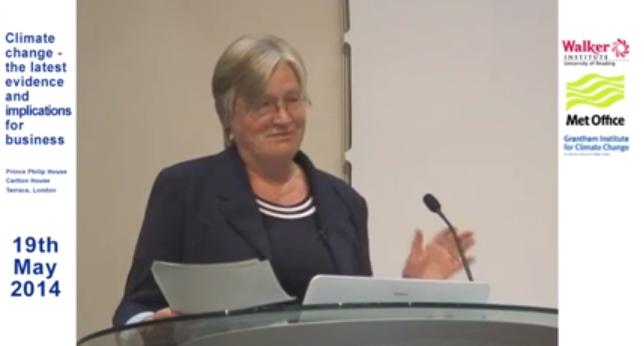May 24, 2014
Climate Change – The Latest Evidence and Implications
The videos from the Transformational Climate Science conference at Exeter University are still not yet available, but on Monday May 19th the Met Office hosted another climate change conference, this time in London. This one was held in conjunction with the Walker Institute at the University of Reading and the Grantham Institute for Climate change at Imperial College London, and was entitled "Climate change – the latest evidence and implications for business". As the title suggests, the audience this time around consisted of businesspeople instead of climate scientists. Some of the speakers from Exeter had headed up to London to speak about all things IPCC for the second time in a week, and those proceedings are already available on video at the Climasphere web site.
That page takes a while to load, but persevere and you will be rewarded with a total of almost four and half hours of information on the latest scientific findings about climate change, interspersed with a couple of breaks and introduced by the Director of the Walker Institute, Professor Nigel Arnell. If that seems overly daunting then I suggest you pick and choose from the following presentations from those who were also present in Exeter. From session 1 on "Climate change – the latest evidence" there's:
- Prof. Chris Field (Stanford University and IPCC WG II co-chair) on "Impacts and adaptation" – 00:20:00
- Prof. Jim Skea (Imperial College and IPCC WG III vice-chair) on "Mitigation of climate change" – 00:42:00
Session 2 on "What will climate change mean for the UK?" was started off by:
- Prof. Stephen Belcher (Head of the Met Office's Hadley Centre) on "Climate extremes" – 01:54:45

Dame Julia Slingo summing up at the "Climate Change – The Latest Evidence and Implications" conference
Since I'm from the UK I was interested in the rest of that session too, but wherever you hail from I also suggest you watch Dame Julia Slingo's summing up starting at 4:17:00. Amongst one or two other things Dame Julia had this to say:
What really struck me when I read the [IPCC AR5] reports was really that the highlights were WG II and WG III and I can say that without any shame, I'm a WG I scientist, because what was coming out of those was seriously now, as Chris said, wide ranging and consequential evidence of the impacts of climate change across many systems, and that's the first time we've been able to say that about the impacts. Just the scientific evidence for a changing climate from the physical evidence. Then we saw from Jim's talk really much, much more detail about our options, about the challenge we face. The phrase that comes to mind now is that at last we're into the phase of what I call "actionable science". This means we are in a place where science is mature enough, it's still not there in many respects but we as a global society must start to take action on the basis of that science. Of course it is uncertain, but that doesn't mean that we can't make risk based assessments and start talking about risk based actions, and accepting we don't all need to have the final decimal point, we just need to know what the scale of the challenge often is.
That being said I think the other thing that comes through time and time again in the discussions is that it's not about the global mean temperature any more, that we need to shape the climate change message much more about "what does it mean for me, regionally and locally", and that's really around extreme or high impact weather, it's about extreme seasons, it's about that intersection between natural variability of the climate and how climate change is often compounding that, and actually the key message from many of us now in the science community is that our climate will become more volatile and more challenging because of climate change.
That means a new science agenda. It means taking us way beyond what was in UKCP09. That was a fantastic start, but it was only a start. The science continues apace, and I think will accelerate in the next few years as we really get to grips with these key problems about regional climate, and we need to make sure that you as a community that acts on that science, hears about it, can shape it and work with us to translate it into action. The IPCC has an inter-governmental role, and that should continue, but we have to more and more find ways to work at the national or even international level, across sectors, to find how to translate what the new science on climate change is telling us into what we should do.
Filed under Climate by
Leave a Comment